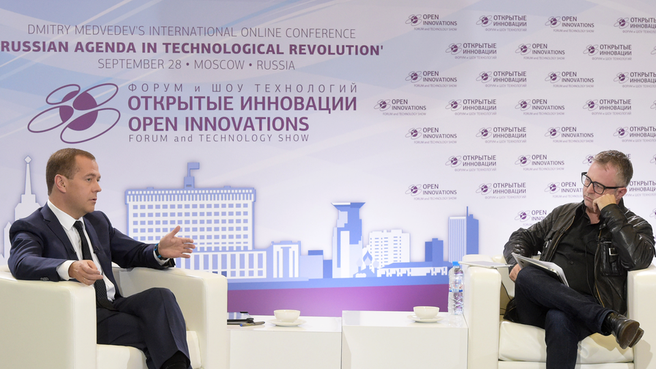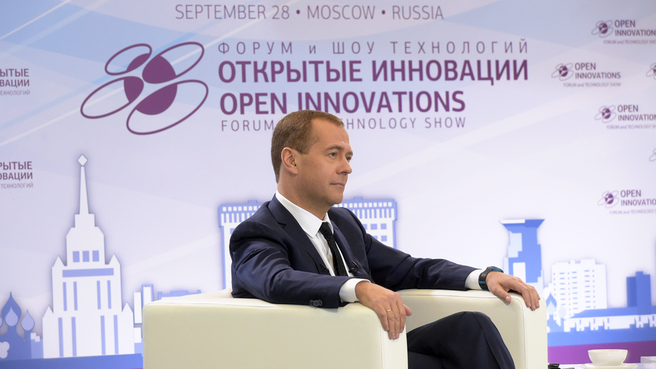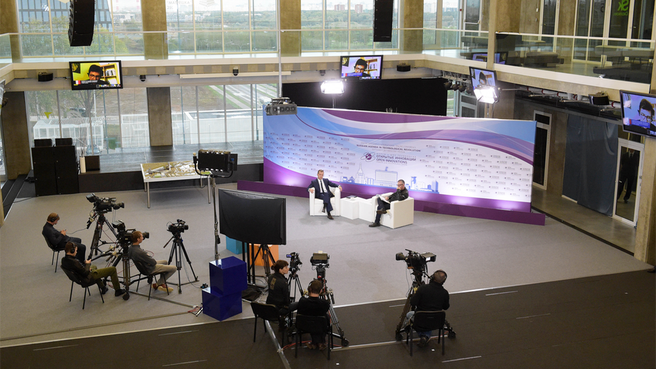Dmitry Medvedev has taken part in the international online conference Russian Agenda in Technological Revolution.
From Dmitry Medvedev’s remarks at the international online conference marking Skolkovo’s fifth anniversary:
The Skolkovo concept
When we started discussing the idea of creating a centre like Skolkovo, we considered how and where to do it. There are many research centres in Russia, and using one of them as a starting point could have been an option. Another option was to engage with a major company or several companies. However, we made a deliberate choice to launch a greenfield project in order to create the infrastructure from the ground up and build a cutting-edge innovation centre. There were no similar facilities in Russia at that time. Comparing Skolkovo to Silicon Valley or some other places is simplistic since Russia is special in its own way; it has its own mentality, academic and business traditions. We thought that it would make sense to build this facility not far from Moscow under the private-public partnership model with a substantial amount of public, but also private, investment. I think that this approach has lived up to expectations.
We need this concentrated effort. This project is about building intellectual capacity, accumulating funding and management solutions in one place. It is for this reason that the Skolkovo project was created. It required major investment, but I’m confident that it was worth it. In every way, this will be a world-class innovation centre.
Start-ups
There are currently about 1,000 start-ups at Skolkovo, and their number will grow.
Skoltech
It was clear to us that a major innovation centre needed a specialised school. Skoltech was conceived from the outset as a vital element for the centre’s development. When we discussed possible partners, we wanted to use best education and management practices for creating an institution of this kind.
MIT partnership
We have done quite a lot with MIT. Skoltech held its first graduation ceremony earlier this year. Those who graduated from Skoltech are forward looking, well-trained specialists.
This partnership continues. I’m glad that our colleagues think that this partnership has yielded encouraging results, especially against the background of the challenging political environment we’ve seen lately, including the far-from-perfect relations between Russia and the United States. The fact that we continue to work together in research and education is important for future generations of students and for strengthening the atmosphere of trust and cooperation in the academic and corporate worlds. This is a very positive example of cooperation.
Intellectual property and the Internet
We are very pleased to have a representative office of a prestigious international organisation such as WIPO here. I hope that this will benefit everyone who is concerned with intellectual property regulation, and create a better situation for intellectual property protection in Russia.
There are no rules for Internet development. In fact there are only two approaches to regulating relations concerning the Internet as well as relations on the web. The first view is that the Internet should be left alone and developed under its own rules. The second is that some system segments should be regulated. As someone who represents the government here, I'm closer to the second point of view. This does not mean that we should try to influence the Web unreasonably, but the internet does have legal implications now.
Regarding domain name registration, it is unlikely that anyone would view the current system as absolutely clear, transparent and fair, because it is concentrated in one country. This looks strange at the very least because we never even gave a mandate to this country (I’m referring to the United States here). It would seem appropriate to create some sort of a general framework to help determine the rules for domain name registration along with other important World Wide Web development elements in the future.
The second set of questions, in fact, concerns intellectual property: how we can protect copyright on the web. We need to develop a plan that will be, on the one hand, acceptable to copyright owners, but on the other hand, will not paralyse the information environment, will not create any impassable barriers for those who use intellectual property in a legitimate way. Combining these approaches is a very large and complex task. I hope that we’ll be working on this together – I mean all the interested countries, of course, with support of the World Intellectual Property Organisation.
User databases
We have a law that requires that databases on our users are located in Russia. Similar laws exist in many other countries. A significant number of large companies install their servers here, including Google and a number of others, or make an agreement with Russian companies about this. We are not trying to oust anyone. We definitely would like anyone operating lawfully in our country to stay and work with us. It is a question of goodwill to find compromise and reach an agreement on specific issues of presence and abidance by Russian regulations.
Just a few years ago, these questions were not of much interest to world leaders or national governments. In any case, hard as I tried at the various summits I attended (such as the G8, G20 and bilateral meetings), I couldn’t draw our partners’ attention to that. Most of my attempts were dismissed with a “no, this is not so important or interesting, not yet anyway, let's get back to this later.” Now it seems to finally dawn on them that the issue needs to be addressed, not only in our country but also in other countries – in Europe and in the United States and elsewhere.
Innovation development
I see no other development path other than that based on innovation. Russia has always been seen as a major power whose prosperity is based on hydrocarbons, arms trade and several other elements, it’s clear that high technology is crucial for development in the near and more distant future.
As for what we are working on now, including at Skolkovo and many other research centres, it’s obvious that our field-specific and other priorities are similar to the majority of research centres around the world. Our research priorities largely coincide.
We have outlined five key priorities for developing research at Skolkovo. They include biotechnology and high-tech energy solutions, because Russia is one of the world’s largest energy suppliers and energy technology is changing and becoming increasingly more complex, which results in the development of a fundamentally new reality. I believe that research should be based on these priorities. We are happy to be cooperating with our partners in this sphere.
Driverless cars
I believe that within about 50 years the so-called driverless or robotic cars will become a common part of the transport system. Hence, the leading car producers and the governments, which set traffic regulations, should coordinate the rules for the use of these vehicles. This is very important. Any vehicle is a source of danger and hence its use should be guided by strict legal and technical regulations.
Cooperation with Asian-Pacific partners
Of course, we can cooperate with any Asia-Pacific “tiger,” developing cooperation and joint high-tech businesses in a number of spheres, considering that research and design and the process of creation as a whole are the strong points of Russia. Our weak point is commercialisation, the implementation of ideas in production, which is something we can learn from our Asia-Pacific neighbours, including Japan, the Republic of Korea, China and several other countries.
Vladivostok research centre
We invested much money and intellect in Far Eastern Federal University, a research centre based in Vladivostok in the Primorye Territory. We have built a large campus. It has become a real university centre. Many top professionals from Moscow and other cities are now working there. The university has many visiting professors and scholars-in-residence from many countries, but primarily from Asia and Pacific.
Open Innovations Forum
I’d like to invite our partners to the Open Innovations Forum in late October. I hope there will be many guests and many interesting solutions. This will bring us closer together and promote mutual understanding and research and production cooperation.
Legislation
We have overhauled legislation on research and intellectual property in the past few years, including the amendment of civil legislation.
Research funding
We are aware of the importance of research and of financing fundamental, applied and university research even in a difficult economic situation and a restricted budget. Therefore, spending on research will not be changed in the 2016 budget from this year at the least. In other words, we will not reduce government spending on research but will instead increase these allocations whenever we can, if and when we find the necessary resources for this.













